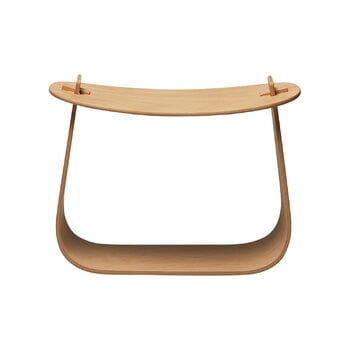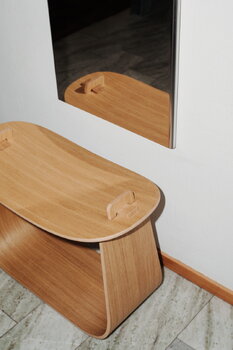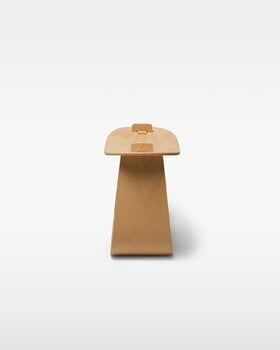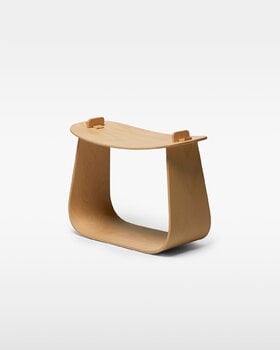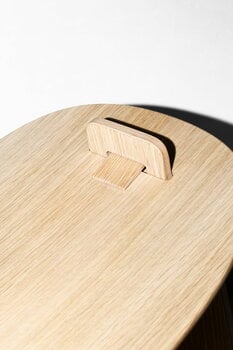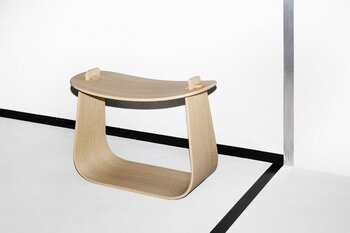Harry stool by Massproductions has a flowing and harmonic visual language inspired by the Japanese Torii shrine gates. The Harry stool's effortless yet impressive design comes from two bent oak sheets held together with traditional Japanese wood joinery techniques. Thanks to its minimalistic design, Harry fits smoothly into various interiors: it can be used as a seat in the kitchen, but it also finds its place as a footstool in the living room or as a side table in the hallway. Multifunctional, and suitable for many situations and spaces, this stool is built to last.
Harry stool, oak
Massproductions
Description
Harry stool by Massproductions has a flowing and harmonic visual language inspired by the Japanese Torii shrine gates. The Harry stool's effortless yet impressive design comes from two bent oak sheets held together with traditional Japanese wood joinery techniques. Thanks to its minimalistic design, Harry fits smoothly into various interiors: it can be used as a seat in the kitchen, but it also finds its place as a footstool in the living room or as a side table in the hallway. Multifunctional, and suitable for many situations and spaces, this stool is built to last.
Product details (6)
- Colour
- Oak
- Width
- 63 cm
- Depth
- 32 cm
- Height
- 47.5 cm
- Material
- Oak
- Weight
- 4 kg
- Product ID
Designer
The British designer Chris Martin moved to Stockholm to do freelance work for IKEA. However, Martin wanted to change his work to a more sustainable and quality-driven direction, so that there would be fewer filters between him and the final product. He met the Swedish designer Magnus Elebäck and together they founded the furniture company Massproductions in 2009.
Read moreReviews (0)
Sustainability
The Product Sustainability Framework, our criteria of sustainable design, helps you find the most sustainable products in our selection. Read below which sustainability criteria this product has met.
Working conditions & labour 7/9
-
Equal opportunities for all employees
-
Commitment to UN Global Compact, fair compensation for all employees
-
Corporate responsibility requirements defined and communicated for suppliers
-
Systematic work for improved inclusion and well-being in the workplace
-
Transparent supply chain
-
Suppliers' compliance to a code of conduct ensured
-
Compliance to the UN Guiding Principles on Business and Human Rights ensured in the supply chain
Eco-friendly production 8/9
-
Fair and resource-wise water-use in production
-
No incineration or landfilling of returned items
-
No use of endangered species as materials
-
No direct environmental emissions or waste (excl. GHGs) from production
-
The sustainability of direct suppliers' production is addressed and monitored
-
Production and material sourcing that respect biodiversity, animal rights, and natural ecosystems
-
Material-efficient and ecological packaging
-
No potentially harmful chemicals used in own production
Climate impact 4/8
-
Company's direct greenhouse gas emissions identified and commitment to reduction
-
Product's carbon impact identified and commitment to reduction
-
Guidance on energy- and eco-efficient use of the product
-
Carbon footprint of the product calculated and goals set to reduce it
Sustainable materials 5/6
-
Sustainable and long-lasting material choices
-
No harmful or hazardous substances
-
Responsible raw material sourcing and production
-
Materials suited for circularity: monomaterials, recyclable finishings, renewable or recycled contents etc.
-
Ecological materials: natural, biodegradable, recyclable or recycled contents
Circular design 4/5
-
High aesthetic quality promoting long-term use of the product
-
Technically durable product design and material choices
-
Design for enduring life-long quality
-
Design and support for product maintenance, repair and upgradability

